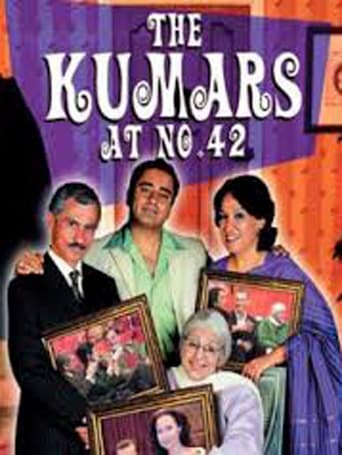Enoch Sneed
The success of this show is very variable and depends on the ability of the guests to join in the concept. Basically a middle-class Asian family have spent their money building a TV studio for their son who wants to be a chat show host. The son hosts the show but his parents and grandmother are on the sidelines and embarrass him by asking the guests very personal questions or relating irrelevant anecdotes.The first ever guest was Richard E Grant and he was brilliant at falling in with the fake family and playing along with the son's obviously doomed ambitions and the family's put-downs. Unfortunately not all the guests can do this and some are obviously quite bewildered at the comments of the 'parents' on the sofa. This can lead to awkward silences on the part of guests and audience. Meera Syal as the plain-speaking, sex and incontinence-obsessed 'Ummi' is the most obviously 'funny' character on the show, perhaps because she is a caricature. The parents, by contrast, appear 'normal' although they are supposed to represent a stereotypical Asian mother and father.For some reason this show has now run for five years. In my view it is another example of humour which has to be seen to be clever by having some kind of sub-text. Will we ever get back to the days when things are funny for their own sake?
Rambimbo
Reruns of this show just started playing in the US on BBC America and I think this show is a hoot to watch. Half the show is a send-up of British middle-class values, and the fact that the family is also Indian is treated so matter-of-factly that it doesn't seem exceptional at all. It's an interesting illustration of how western and eastern cultural mores can co-exist. Furthermore, the non-sequitor type questions asked by the Kumar family members reveal how our interest in celebrities is partly a self-absorbed wish to see ourselves reflected back. However, the primary thing about this show is that it's witty and entertaining.I especially like that the celebrity guests aren't the sole focus. The show's unusual format seems to draw a genuine and candid reaction from the guests, most of whom are bemused but are clearly willing to join into the spirit of the show. This tells us more about who they are than all those canned anecdotes one hears on the typical late night talk shows.
de_niro_2001
One other reviewer describes this as part chat show, part sitcom and that's a good way of describing it. Where did they get the idea for this? It's a very clever idea. A young Asian guy, still living with his parents, wants to be a chat show host and his successful businessman dad builds him a studio in the back garden. But while he's interviewing the celebrities, his Mum, Dad and Granny come in to the studio and ask the celebrities questions. It's quite obvious that the celebrities on the show enjoy it. Another reviewer says it reflects the sad worship of celebrities but I don't think that's a fair comment. The show is entertaining and there is a little of the spirit of Morecambe and Wise in it. Granny Kumar (aka "Ummi") is the real show stealer but Aswan had a really good line when Sanjev was interviewing some actress from East Enders and she said the Kumars were like people on East Enders. Aswan said "Yes, but we speak better English". Very true! In the programme featuring Patrick Stewart, Ummi said she had read on a website that Patrick Stewart didn't like talking about Star Trek then Sanjev came on in a Star Trek uniform. The show is brilliant and I can see why the Americans and Australians have produced their own versions. It's a pity I'm not famous enough, I'd love to be the Kumars' guest!
owston-tj
The clever aspect of the Kumar comedy is it is a reflection of the attitudes and position of many people of Asian descent in modern Britain, part of British life but with a hint of Asian culture. The family is associated with Indian culture and religion(they have nothing to do with Pakistan and the 'P' word is the British racist equivalent of the American 'N' word).The great aspect of the series is that we can watch the comedy knowing that the humour is safe and is usually directed against the pretentions of the son and his celebrity aspirations. The Grandmother is a brilliant creation of Meera Syal a gifted creative actor and writer, the comedy lines are usually hers, though the mother and father can easily aid the sons frustrations. Never do interviews with the guest celebrities conclude without a family intervention, usually witty but always funny.
Its perhaps not for those who like the very laddish and moronic humour of other British comedy or the 1950's-1990's racist and homophobic humour which no longer has a place on modern British television. It avoids direct political comment and attacks on British racism, yet becomes in itself a comment on the (partial) success of anti-racist campaigns in modern British life, though reflects sadly current worship of celebrities.Its a cult show, but one that entertains many of its more sophisticated viewers and there are millions of those in Britain.
